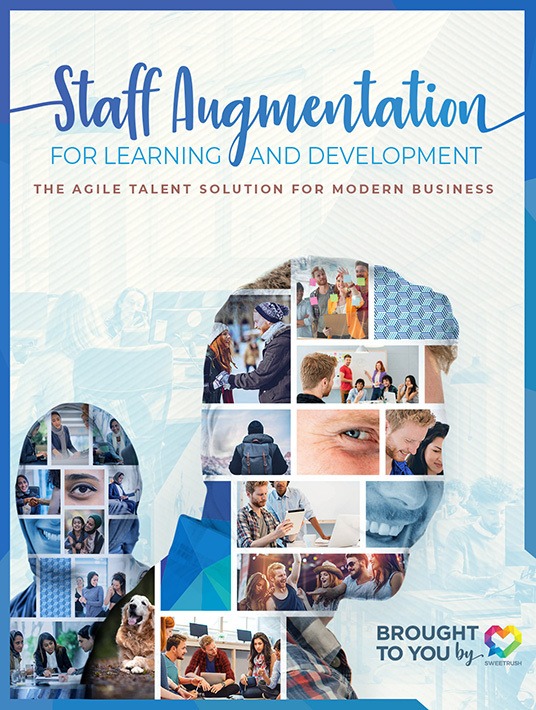Evaluating A Staff Augmentation Company That Provides Temporary L&D Professionals
In life, we face an endless series of choices that are about the people with whom we associate, personally and professionally. On the professional side, when choosing a staff augmentation vendor (and, really, any vendor), your considerations are not so different compared to the personal. Do you intuitively trust the company and the people you’ll be working with? Do you feel they really care about you? Will they have your back if bumps occur along the path? Do they have a long-term mindset and approach in how they engage with you in that light or do you sense the relationship is more or less transactional? It’s not so different as compared to the personal side of things.

This article is not about promoting the benefits of choosing the staff augmentation path or of working with a vendor to help you secure the talent. Bringing on temporary talent is just a fact of business life; one of the tools you have as you build teams to get work done. But what I will say is that it’s a particularly versatile choice, and, being on the vendor side, I have seen it work for so many of our client-partners and feel good about helping them build teams.
Here are 5 vital factors to consider when you evaluate a staff augmentation company:
1. Are They The People You Want To Represent You?
I start with this consideration because it may be the most important, and it’s often overlooked. Hiring a staff augmentation vendor means they will be representing you, and you can view them as an extension of your team and your brand. Your brand means so much that you should be proud and protective, and anyone representing that brand should meet your standards for not only what they do, but who they are.
Here’s a way to evaluate how a staff augmentation vendor’s actions will affect your brand: representing you, casting a net for talent, thousands of people will likely see the job listing and be touched by your chosen vendor and your brand. Of those thousands, many will be interested in working with you and will respond to and be responded to by your vendor, and so they will again be touched by your vendor representing your brand.
In the end, there will be one or two very happy people who, after the process, are the ones chosen. But there may be hundreds and even thousands who have been rejected. And so how each and every one of those people feel impacts how they feel about your brand.
Perhaps, you have not thought of it in just this light, but I think it’s important to.
So, how do you make the determination that you feel comfortable choosing this vendor to represent you? Do your due diligence: meet with the actual folks who will be doing the recruiting so you can judge their character yourself. Ask to understand their process and how they “reject” people along the path. Check how they are viewed on Glassdoor and what their employees feel about them [1]. It won't take a lot of your time, but it’s crucial.
2. Size Matters
In business, we all want to work with individuals or organizations that look upon us as important and are very capable of getting the job done. There are smaller mom-and-pop organizations, large industrial-strength ones, and those in the middle. Most of the time, just like Goldilocks, the “just right” choice is likely in the middle.
You need to believe that the vendor you’re engaging can get the job done well in a reasonable amount of time. You also want them to look upon you as being very important and give you the time and respect you deserve.
That being said, there might be instances when a very small vendor specializes in a narrow niche, and it’s what you need at that moment. Or, there may be times when you need 20 training facilitators, tomorrow, and you need to bring on the industrial-strength player. Size matters, so choose accordingly.
3. Choose A Vendor That Really Knows And Focuses On Your Industry
Imagine you have a bad headache. You go to the drugstore and, on the counter, you see two bottles of pills. One says “For all kinds of pain”; the other reads “For headaches and migraines.” Which one would you pick? Most likely, you’d choose the one more attuned to your specific needs.
The work you do and we do in Learning and Development is very nuanced. Or, put another way, your needs and the talent who can fulfill those needs are nuanced. Each time we work with a client, they have a very specific and varying set of needs.
Instructional Designers, Project Managers, and Graphic Artists come in many flavors. It’s an essential part of the up-front process to really work with you, to drill down with you, to understand what you’re trying to accomplish, and the specific talent you need to accomplish the tasks at hand.
To do this, you need a vendor who truly grasps the work you do. And, also, a vendor who will then bring that same understanding to assessing who’s the right talent for you in this instance. Calling it by its more colloquial term, it’s "matchmaking."
In staff augmentation, the 800-pound gorilla that drives a lot of the market is Information Technology. There are many IT staffing vendors, and they’re all ready and willing to work with you, but it’s our strong contention you should seek a vendor that intimately knows your business, the work you do, and the talent who can fulfill that work.
4. Choose A Vendor Whose Process And Support Does Not End Once You Bring Talent On Board
You might think that your relationship with a staff augmentation vendor ends when you’ve chosen the resource who'll work with you. But, bringing on someone temporarily is different than a full-time hire you can ramp up over a longer period of time. You need your temporary staff member to get in gear quickly and be productive and focused on the task at hand. Yet all of us need some level of support in the form of orienting, coaching, mentoring along the way.
It’s our belief that a responsible vendor will continue to support and communicate with both the talent and you the whole time the resource is on the job.
You should be prepared to do your part, but choose a vendor that has a process to stay in regular communication with the talent (and you). The vendor needs to help ensure the staffer is successfully adapting to your culture and environment, getting along with the team, and is getting what’s needed to meet the responsibilities and due dates of the project. You want a vendor that cares deeply that the relationship, for all parties, will be a success.
5. The Obviously Self-Serving Variable: Work With A Vendor That Can Do More!
Yes, this is clearly a big advantage to working with SweetRush or a similar vendor and hence self-serving, but we believe it to be true and important to evaluate in a staff augmentation company: It's best to work with a vendor that can do more than staff augmentation.
Your vendor should be able to lend expertise as needed at key moments. For example, if the temporary talent needs some technical assistance, or help choosing graphical elements, or help with recording audio narration (and this list goes on), we can assist at those moments.
Additionally, when you come to us seeking temporary talent, sometimes we’ll advise you that we can do it better by taking on your full project, and we can explain why, in this case, it is a better choice. Conversely, sometimes when clients approach us with a full project, we steer them toward the staff augmentation route, again depending on what we feel will best meet the client’s needs. This breadth of capabilities allows us to provide you the optimal path forward, and we’d recommend working with a vendor who can offer you all those options.
We’re in an exciting field during exciting times, and how successful we always depend on the people on our teams. So, choosing a staffing vendor to help you build those teams is a vital decision, and I hope this short article brings some clarity to your considerations when choosing a staff augmentation vendor. Download the eBook Staff Augmentation For Learning And Development: The Agile Talent Solution For Modern Business to find out more about making this strategy work for your organization from SweetRush’s experts.
References:









